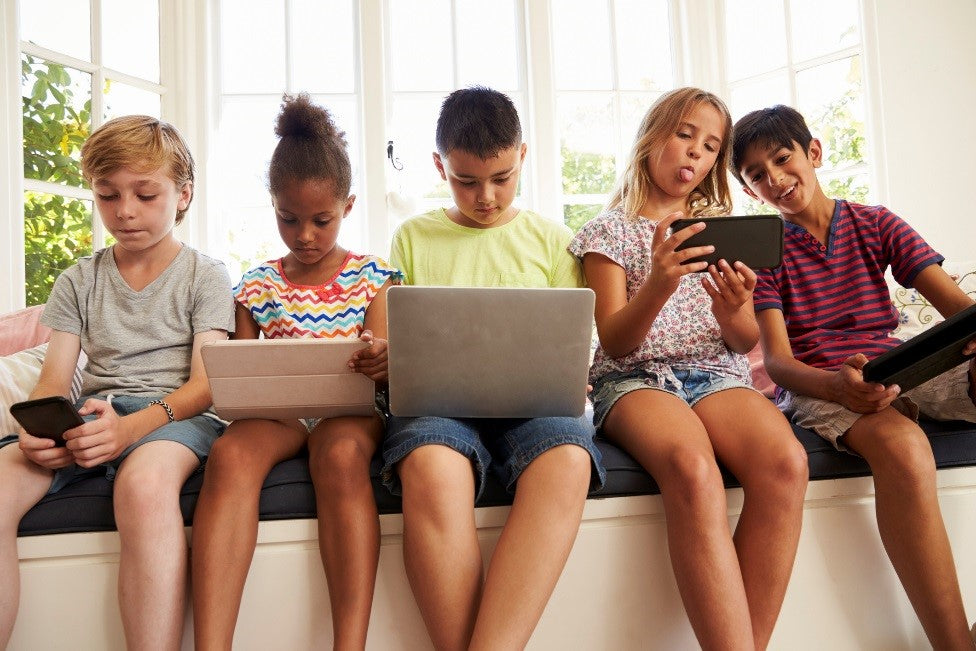There is no an product in your account
please add some product to cart.
Excessive Screen Time Can Irreversibly Harm Kids’ Brains
Posted by Daniel Rivera on 13 Mar, 19
An entire generation of kids is growing up with smartphones, tablets, computers, and other internet-enabled electronic devices. If you’re considering getting your preschooler their first tablet, or a smart phone for your ‘tween’, you might want to keep in mind the early results of a groundbreaking study which confirms many parents’ fears about the effects of all that screen time. Researchers have now confirmed that excessive screen time can irreversibly harm your child’s brain.
The National Institutes of Health (NIH) performed a large study comprised of 11,874 children aged 9 and 10 at 21 sites throughout the U.S. This $300 million project known as the Adolescent Brain Cognitive Development Study (ABCD Study) will follow all these children throughout young adulthood to age 21.
Preliminary results have already been released as of December 2018 by Gaya Dowling, PhD. Although, not all the data is yet available, the early results are both insightful and alarming. Just as many experts and parents alike have long suspected, all that screen time is impacting our children’s mental health and emotional development. Equally alarming is that it’s also changing the physical structure of their brains (and, not for the better).
Too Much Screen Time Too Early Damages Children For Life
The initial data has revealed 2 critical discoveries:
1. Children spending 2 hours or more (per day) of screen time get lower scores on thinking and language tests
2. MRI’s of children spending 7 hours or more (per day) on computers, tablets, smart phones, and even televisions revealed significant thinning of the outermost layer in the brain, the cortex. (The cortex is responsible for sensory input, executive attention, decision making, planning, prioritizing, organizing, impulse control, and cognitive control).

Teenagers, by the way, spend 4.5 hours, on average, with their mobile phones, an additional 4 hours of computer time and 3.5 hours watching tv, every day. The combined total time equates to at least 12 hours per day of screen time. This finding should be enough to give most parents significant pause.
The baseline data in this groundbreaking study will be made available to all scientists starting in 2019. Further exploration of the effects all this screen time is having on kids mentally and physically will continued to be monitored until all children have reached age 21.
Dr. Dowling told “60 Minutes” that while some questions about the impact of screen time will be answered over the next few years, the long-term effects won’t be known for many years — possibly at the cost of our children’s mental and emotional development.
What can parents do to protect their children?
It comes as no surprise that parenting, the toughest job on the planet, is extremely difficult. Many modern parents are so busy that it’s tempting to park the kids in front of these devices to buy yourself some time to get things done. Even if your kids prefer games with some degree of educational value, don’t let that fool you into thinking that damage isn’t being done.

This doesn’t mean you should ban your kids from screen time entirely. They do serve an informational purpose. However, it’s very important that you monitor your children’s screen time – and limit it.
If you’re planning to buy your children a video game console, for example, go ahead, but take advantage of the features available today that track usage and cut them off once they’ve reached the limit.
Apple devices allow parents to set up time restrictions on apps and get information about usage. Apps like Instagram and Facebook have also added settings to monitor usage. Unfortunately, many parents don’t realize these features exist.
You can also provide children with alternatives that tie in to whatever it is they enjoy doing on their devices. For example:
- If your child plays a lot of puzzle games like Candy Crush, buy him/her some jigsaw puzzles or Sudoku books.
- If your child enjoys country life simulators like Stardew Valley or Animal Crossing, take him fishing, buy him some books about wildlife, or start a garden together.
- If your teenager can’t peel herself away from social media sites like Instagram, encourage her to meet her friends at the mall to do some people-watching and catch up on the latest gossip in a more engaging way.

- If your kids like world-building games like Minecraft, an age-appropriate Lego kit might hold their attention nicely while letting them exercise some creativity.
- If they’re addicted to Fortnite, a Nerf battle with friends could get them running around and away from their screens.





